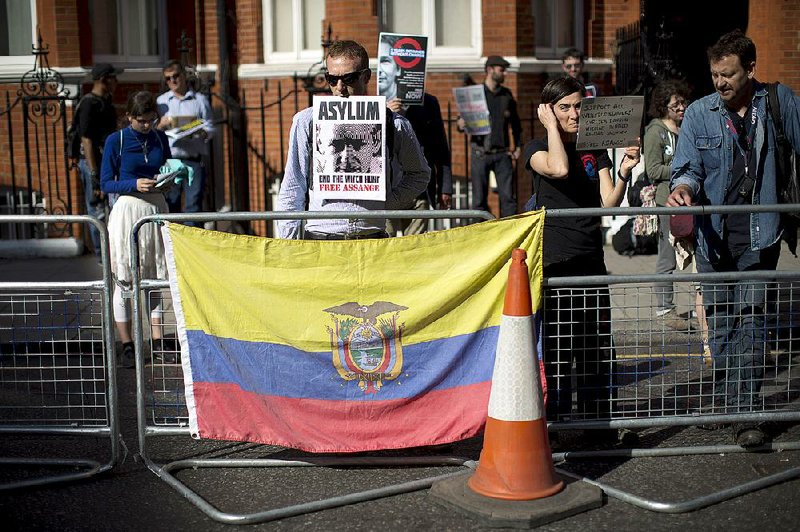According to a recently leaked document, the son of al-Qaida mastermind Osama bin Laden, Abdallah bin Laden, sent a letter to the U.S. Embassy in Saudi Arabia to ask for his father's death certificate.
In response, the embassy wrote to Abdallah to inform him that there was no death certificate issued for the older bin Laden.
The letter went on to suggest other ways that the al-Qaida leader's death could be confirmed.
The exchange has come to light thanks to the latest release from WikiLeaks, the secrets-sharing organization helmed by Julian Assange. On Friday, the organization was in the process of releasing more than 500,000 cables and other documents purportedly from the Saudi Foreign Ministry, which it dubbed "The Saudi Cables."
There was no immediate way to verify the authenticity of the documents, although WikiLeaks has a long track record of hosting large-scale leaks of government material. Many of the documents carried green letterhead marked "Kingdom of Saudi Arabia" or "Ministry of Foreign Affairs." At least one appeared to be from the Saudi Embassy in Washington.
The U.S. Embassy's response to Abdallah was included within the release. It is dated Sept. 9, 2011, approximately four months after bin Laden was killed by U.S. forces during a raid on his hideout in Pakistan. U.S. officials have said that bin Laden was later buried at sea. Requests to publish photographs of bin Laden's body or his burial have been denied, and any photographs taken are suspected to have been destroyed.
In the letter to Abdallah bin Laden, Glen Keiser, a consul general at the U.S. Embassy in Riyadh, explains that the lack of a death certificate for bin Laden is "consistent with regular practice for individuals killed in the course of military operations."
Keiser goes on to suggest that the criminal case against Osama bin Laden had been dropped because of his death, and he describes a process for requesting the order of "nolle prosequi" (which literally means "unwilling to pursue") from the court, which could act as proof of death.
It's unclear why Abdallah bin Laden had requested the death certificate.
One of the other documents, dated 2012, appears to highlight Saudi Arabia's well-known skepticism about the Iranian nuclear talks. A message from the Saudi Arabian Embassy in Tehran to the Foreign Ministry in Riyadh describes "flirting American messages" being carried to Iran by an unnamed Turkish mediator.
Another 2012 missive, this time sent from the Saudi Embassy in Abu Dhabi, said the United Arab Emirates was putting "heavy pressure" on the Egyptian government to not try former President Hosni Mubarak, who had been overthrown in a popular uprising the year before.
Some of the concerns appear specific to Saudi Arabia.
In an Aug. 14, 2008, message marked "classified and very urgent," the Foreign Ministry wrote to the Saudi Embassy in Washington to warn that dozens of students from Saudi Arabia and other Persian Gulf countries had visited the Israeli Embassy in the U.S. capital as part of an international leadership program.
"They listened to diplomats' briefings from the embassy employees, they asked questions and then they took pictures," the message said, asking the embassy for a speedy update on the situation.
The Associated Press was able to partially verify a handful of documents' authenticity by calling the telephone numbers included in many of them. WikiLeaks spokesman Kristinn Hrafnsson told AP he was confident that the material was genuine.
It is not clear how WikiLeaks got the documents, although in its statement the website referred to a recent electronic attack on the Saudi Foreign Ministry by a group calling itself the Yemen Cyber Army. Hrafnsson declined to elaborate on the statement or say whether the hackers subsequently passed documents to WikiLeaks.
The Saudi Embassy in Washington did not immediately return repeated messages seeking comment.
In its statement, WikiLeaks said the release coincided with the three-year anniversary of its founder, Julian Assange, seeking asylum in the Ecuadorian Embassy in London.
The WikiLeaks founder entered the building June 19, 2012, to avoid extradition to Sweden for questioning about alleged sexual assaults.
Sweden wants to question Assange over alleged rape, sexual molestation and coercion regarding two Swedish women he met in 2010. Assange denies the allegations.
Assange supporters rallied Friday outside the embassy. One supporter held up a sign with a drawing of Assange and the words "at the frontline of the truth."
Information for this article was contributed by Adam Taylor of The Washington Post and by Raphael Satter and staff members of The Associated Press.
A Section on 06/20/2015
